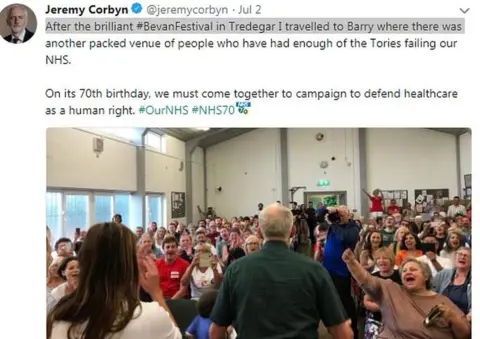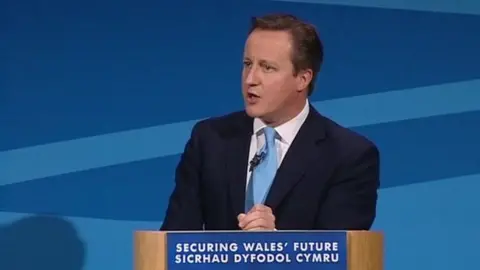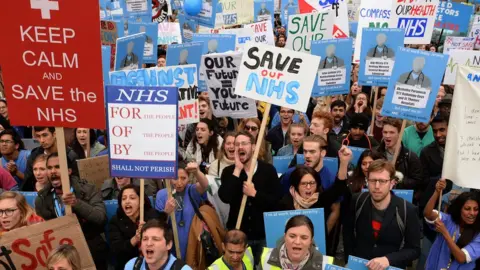NHS 70: How politicians exploit our love of the institution
There's no prize for spotting the mistake Jeremy Corbyn made on Twitter at the weekend.
 Jeremy Corbyn/Twitter
Jeremy Corbyn/TwitterOpponents gleefully reminded him that Barry's local health services have been under the stewardship of Labour governments since Tony Blair's landslide victory 21 years ago.
But if he was confused, Mr Corbyn is not alone. Polls for the BBC in recent years have suggested around a third of people in Wales think the nation's health service is run from Westminster.
Mr Corbyn was in Wales to celebrate the 70th anniversary of the NHS.
All these years after it started, questioning the principle of state-run healthcare, free at the point of need, is taboo in politics.
Politicians use the institution's unique place in the public's affections to attack rivals and position themselves.
 Getty Images
Getty ImagesConservative MEP Daniel Hannan caused a headache for his party leader David Cameron in 2009 when he dared to criticise the NHS on American TV.
Mr Cameron, who was then busily trying to reinvent the Tories as champions of the health service, called Mr Hannan "eccentric". Labour's Andy Burnham, the health secretary at the time, branded him "unpatriotic".
In Wales, where Aneurin Bevan is idolised by Labour, the idea of the institution as part our national identity is arguably even stronger.
As prime minister, Mr Cameron regularly attacked the Welsh Government's record on healthcare. But when he called the England-Wales border a "line between life and death", Carwyn Jones said he had gone beyond political knockabout. This was a "war on Wales", the first minister said.
Mr Jones was at it again in the Senedd chamber yesterday, saying: "We have a statue to Aneurin Bevan. We will never have a statue to Jeremy Hunt."

Other parties want in on the act. Leanne Wood, Plaid Cymru's leader, called the NHS "Wales' greatest invention".
Theresa May's rhetoric is less bellicose, but she has followed David Cameron's cue. She derides Labour's record, accusing it of failing to match the increases in health spending seen in England.
Technically, she's correct, but she ignores the fact that health spending per head is higher in Wales.
So why pick on Welsh Labour?
It's because voters, by and large, more strongly associate the NHS with Labour than the Conservatives.
 PA
PAProfessor Roger Awan-Scully, of Cardiff University's Wales Governance Centre, says: "We traditionally talk about issue ownership, and health has very much been a Labour issue."
For years, the Welsh Tories plugged away at trying to change this.
By early 2016, with an assembly election looming, a study of voters' attitudes, led by Prof Awan-Scully, narrowly put the Tories ahead of Labour in Wales when people were asked which party was best able to handle health. That was not the case across the UK as a whole, where the Conservatives trailed.
As that year's election campaign began, some of us journalists expected to hear the Conservatives say more about the NHS.
Sources told me at the time there was a debate inside the party over just how hard to push. Some feared undermining the progress they had already made. What's more, the backdrop to that election wasn't the most conducive for them. While Welsh politicians were on the campaign trail, junior doctors were on strike in England.
Much of what the Tories have to say about the Welsh Government's record on the NHS stems from a decision in 2011 to freeze funding for frontline care - in reality, a budget cut.
The Welsh Government wanted to spread the pain of austerity between services. Siphoning money from care homes to hospitals, ministers thought, would store up more problems for the NHS.
As my colleague Arwyn Jones reported last week, Health Secretary Vaughan Gething now says that decision didn't work.
It's a significant admission, particularly as Welsh Labour gears up for a leadership election, in which Mr Gething is a candidate.
To win he must defeat the favourite - finance secretary and former health secretary, Mark Drakeford.
With the NHS swallowing almost half the Welsh Government's day-to-day spending, it's difficult to imagine a contest between them where the future of the NHS doesn't feature prominently.
